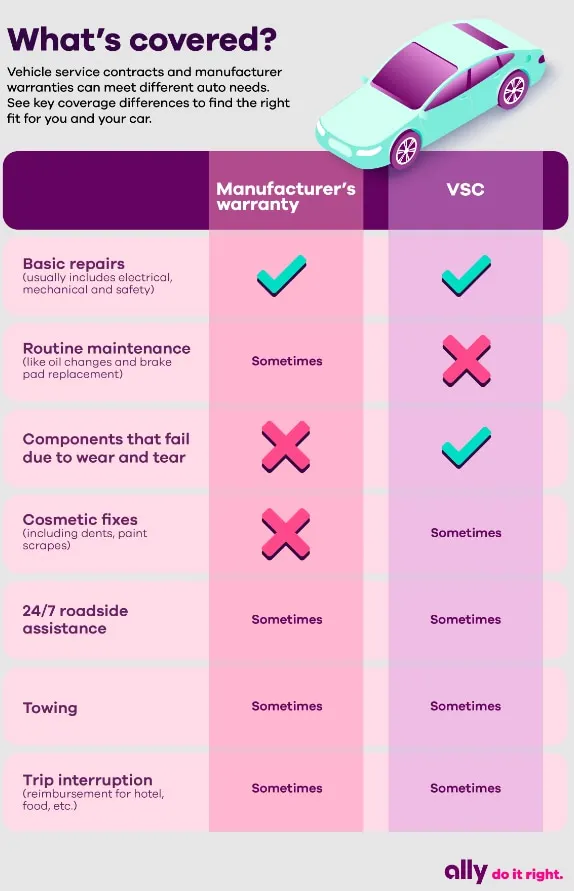What we'll cover
The differences between warranties and vehicle service contracts
The benefits and drawbacks of both coverage types
How to decide which option is right for you
If you're driving around with your check engine light on just to avoid the repair costs — it's time to talk. Unknown expenses can be stressful, but protections from a manufacturer's warranty or vehicle service contract (VSC) can help give you peace of mind. Not sure what the difference is or which option is best for you? We've got you covered.

What is a manufacturer's warranty?
A manufacturer's warranty is provided by auto manufacturers on new vehicles. The coverage typically lasts three years or 36,000 miles and covers routine maintenance and repairs due to manufacturing defects, but not problems related to an accident or wear and tear.
Because manufacturer's warranties are limited, they can't be reinstated and are only provided on new cars. Even though it's new to you, a used car that's purchased outside of three years or 36,000 miles will typically not be eligible for a manufacturer's warranty.
Read more: Keep your auto expenses on track with spending buckets
Advantages of a manufacturer's warranty
Some of the perks of this type of warranty include:
Guaranteed original parts for repairs and technicians trained on your vehicle
Included at no cost with the purchase of a new car (or sometimes used car within the mileage limits, if applicable)
Includes basic repairs for mechanical, electrical and safety issues
Disadvantages of a manufacturer's warranty
Some downsides of a manufacturer’s warranty include:
Does not include repairs due to wear and tear
Cosmetic fixes like dents and paint scrapes are not covered
Repairs must be done at a dealership
What is a vehicle service contract?
VSCs, sometimes referred to as extended warranties, are more flexible than a manufacturer’s warranty and may allow you to choose how long you'd like to protect your vehicle. You can purchase one when you first buy your car or for a car you already own. It can often be purchased directly from the vehicle manufacturer or from a third-party provider.
Unknown expenses can be stressful, but protections from a manufacturer's warranty or VSC can help give you peace of mind.
A vehicle service contract is an additional expense — but the cost of coverage could be significantly less than the out-of-pocket charges you'd be responsible for later, should your car require a repair.
A vehicle service contract helps to protect a plethora of vehicle components and covers various types of repairs, including many high-tech electronic features, engine components and transmission components. It can often be purchased either directly from the vehicle manufacturer or from a third-party provider. A VSC typically covers both the cost of the parts and the labor. Some repairs are excluded from coverage depending on the VSC you purchase. The Ally Premier Protection suite of products covers a range of needs.With a more comprehensive VSC, coverage may also include perks like 24/7 roadside assistance, towing, trip interruption protection (reimbursement for a hotel room and food if car troubles require an overnight stay) or rental car reimbursement. These additional perks may be capped at a certain dollar amount— but they can help to alleviate the all-around hassle of a major vehicle issue.
Most often, neither a VSC nor manufacturer's warranty will cover cosmetic fixes (paint scrapes or dents) or routine maintenance, like oil changes, tire rotation or replacing windshield wipers.
Advantages of a vehicle service contract
Some of the benefits of a VSC usually include:
The ability to customize coverage and payment options
Repairs can be done at the dealership or by any certified technician
You can extend coverage after the manufacturer's warranty expires
Covers repairs due to wear and tear
It can be transferred to a new owner
Disadvantages of a vehicle service contract
Some downsides of VSCs include:
Not all repairs are covered
Charged in addition to cost of vehicle
Coverage may go unused
It doesn't include routine maintenance like oil changes and brake pad replacements
Not all plans include guaranteed original manufacturer parts or repairs
What is a manufacturer's warranty?
When it comes to coverage for repairs to your vehicle, you don't want to be left out in the cold. Take the time to understand your options and know exactly what's protected by your manufacturer's warranty or VSC to drive on with peace of mind.


